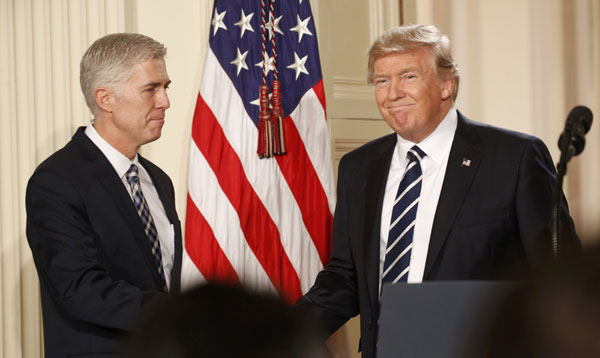Trump picks conservative judge Gorsuch for US Supreme Court
 |
|
US President Donald Trump shakes hands with Neil Gorsuch (L) after nominating him to be an associate justice of the US Supreme Court at the White House in Washington, D.C., Jan 31, 2017.[Photo/Agencies] |
WASHINGTON - President Donald Trump on Tuesday nominated Neil Gorsuch for a lifetime job on the US Supreme Court, picking the 49-year-old federal appeals court judge to restore the court's conservative majority and help shape rulings on divisive issues such as abortion, gun control, the death penalty and religious rights.
The Colorado native faces a potentially contentious confirmation battle in the US Senate after Republicans last year refused to consider Democratic President Barack Obama's nominee to fill the vacancy caused by the February 2016 death of conservative justice Antonin Scalia.
Gorsuch is the youngest nominee to the nation's highest court in more than a quarter century, and he could influence the direction of the court for decades.
Announcing the selection at the White House flanked by the judge and his wife, Trump said Gorsuch's resume is "as good as it gets." Trump said he hopes Republicans and Democrats can come together on this nomination for the good of the country.
"Judge Gorsuch has outstanding legal skills, a brilliant mind, tremendous disciple, and has earned bipartisan support," Trump said.
"Depending on their age, a justice can be active for 50 years. And his or her decisions can last a century or more, and can often be permanent," Trump added.
Gorsuch is a judge on the Denver-based 10th US Circuit Court of Appeals and was appointed to that post by Republican President George W. Bush in 2006.
Some Democrats in the US Senate, which votes on whether to confirm judicial nominees, have already said they would seek to block whoever Trump nominates.
Gorsuch is considered a conservative intellectual, known for backing religious rights, and is seen as very much in the mold of Scalia, a leading conservative voice on the court for decades.
A senior administration official, speaking on condition of anonymity, said the choice of Gorsuch was seen by the White House as a significant departure from Supreme Court nominations from the recent past, given that many justices have come from the eastern United States. Gorsuch lives in Boulder, Colorado, where he raises horses and is a life-long outdoorsman.
The official described Gorsuch as a mainstream judge who should easily be confirmed by the Senate. The official noted that the Senate confirmed him for his current judgeship in 2006 by voice vote with no one voting against him.
The official said the White House feels Gorsuch has the qualities that Democratic senators said they wanted to see in a justice during visits with senior Trump officials about filling the vacancy.
"He plays it straight. He sticks to principles, and his opinions reflect a consistency regardless of who is in his courtroom," the official said of Gorsuch.
Trump made his choice between two US appeals court judges, Gorsuch and Thomas Hardiman of the Philadelphia-based 3rd US Circuit Court of Appeals, according to a source involved in the selection process.
Gorsuch became the youngest US Supreme Court nominee since Republican President George H.W. Bush in 1991 selected conservative Clarence Thomas, who was 43 at the time.
He is the son of Anne Burford, the first woman to head the US Environmental Protection Agency. She served in Republican President Ronald Reagan's administration but resigned in 1983 amid a fight with Congress over documents on the EPA's use of a fund created to clean up toxic waste dumps nationwide.
Trump's selection was one of the most consequential appointments of his young presidency as he moved to restore a conservative majority on the Supreme Court that had been in place for decades until Scalia died at age 79 on Feb. 13, 2016.
Trump, who took office on Jan. 20, got the opportunity to name Scalia's replacement only because the Republican-led US Senate, in an action with little precedent in US history, refused to consider Obama's nominee for the post, appeals court judge Merrick Garland. Obama nominated Garland on March 16 but Republican senators led by Majority Leader Mitch McConnell denied Garland the customary confirmation hearings and vote.
Trump has said his promise to appoint a conservative justice was one of the reasons he won the Nov. 8 presidential election, with Christian conservatives and others emphasizing the importance of the pick during the campaign. Trump last week said evangelical Christians would love his nominee.
Trump's fellow Republicans hold a 52-48 majority in the Senate. The minority Democrats, irate over Garland's rebuff, potentially could try to block the nomination with procedural hurdles.
The new appointee would expand the court's conservative wing, made up of John Roberts, Anthony Kennedy, Clarence Thomas and Samuel Alito. Kennedy long has been considered the court's pivotal vote, sometimes siding with the liberals in key cases such as the June 2016 ruling striking down abortion restrictions in Texas.
The court's restored conservative majority likely would be supportive toward the death penalty and gun rights and hostile toward campaign finance limits. Scalia's replacement also could be pivotal in cases involving abortion, religious rights, presidential powers, transgender rights, voting rights, federal regulations others.
Gorsuch has strong academic qualifications, with an Ivy League education: attending Columbia University and, like several of the other justices on the court, Harvard Law School. He also completed a doctorate in legal philosophy at Oxford University, spent several years in private practice and worked in George W. Bush's Justice Department.
Gorsuch joined an opinion in 2013 saying that owners of private companies could object on religious grounds to a provision of the Obamacare health insurance law requiring employers to provide coverage for birth control for women.
As long as Kennedy and four liberals remain on the bench, the court is not expected to pare back abortion rights as many US conservatives fervently hope. The Supreme Court legalized abortion in the landmark 1973 Roe v. Wade ruling. In June, the justices ruled 5-3 to strike down a Texas law that restricted abortion access, with Kennedy and the liberals in the majority.
The current vacancy is the court's longest since a 391-day void from 1969 to 1970 during Republican Richard Nixon's presidency. After Abe Fortas resigned from the court in May 1969, the Senate voted down two nominees put forward by Nixon before confirming Harry Blackmun, who became a justice in June 1970. Aside from that one, no other Supreme Court vacancy since the US Civil War years of the 1860s has been as long as the current one.
Advocacy groups geared up for a fight.
Judicial Crisis Network, a conservative legal advocacy group, said it would launch the first part of a $10 million media advertisement campaign on Tuesday night in favor of Trump's pick. The effort will hold Senate Democrats who face election in 2018 "accountable for their choice" on the Supreme Court, the group said.
Liberal groups including People For the American Way and abortion rights advocate NARAL Pro-Choice America planned a nighttime rally in opposition to Trump's nominee outside the Supreme Court after the announcement.
Some Democrats have threatened to pursue a procedural hurdle called a filibuster, meaning 60 votes would be needed in the 100-seat Senate unless its long-standing rules are changed. Trump's fellow Republicans hold a 52-48 majority, meaning some Democratic votes would be needed to confirm his pick.
Trump said last week he would favor Senate Republicans eliminating the filibuster, a change dubbed the "nuclear option," for Supreme Court nominees if Democrats block his pick.
Trump during his presidency may get to make additional appointments to the Supreme Court. Liberal Ruth Bader Ginsburg, who Trump called upon to resign last July after she called him "a faker," is 83 while Kennedy is 80. Stephen Breyer, another liberal, is 78.
If any of those three is replaced by a Trump appointee, conservatives would be eager to bring cases challenging the Roe v. Wade ruling in the hope it would be overturned, long a goal for many Christian conservatives.

























